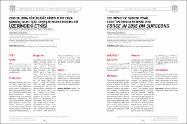| dc.contributor.author | Yılmaz, Ahmet | |
| dc.contributor.author | Demiral, Gökhan | |
| dc.contributor.author | Şahin, Gürol | |
| dc.contributor.author | Yener, Oktay | |
| dc.contributor.author | Kocataş, Ali | |
| dc.contributor.author | Bölük, Salih | |
| dc.date.accessioned | 2020-04-20T08:04:29Z | |
| dc.date.available | 2020-04-20T08:04:29Z | |
| dc.date.issued | 2013 | en_US |
| dc.identifier.citation | Yılmaz, A., Demiral, G., Şahin, G., Yener, O., Kocataş, A. ve Bölük, S. (2013). 2005 yılında yürürlüğe giren Türk Ceza Kanunu’nun (TCK) cerrahi branş hekimleri üzerindeki etkisi. Adli Tıp Dergisi, 27(3), 158-172. https://doi.org/10.5505/adlitip.2013.42714 | en_US |
| dc.identifier.issn | 1018-5275 | |
| dc.identifier.uri | https://hdl.handle.net/20.500.12511/5165 | |
| dc.identifier.uri | https://doi.org/10.5505/adlitip.2013.42714 | |
| dc.description.abstract | TCK’nın cerrahi branş hekimleri üzerindeki etkisini ve defansif tıbbın hangi boyutta uygulandığını tespit etmek amaçlanmıştır. Yöntemler: Hekimler hakkında yaş, cinsiyet, branş, dava edilme durumu, TCK’nın ilgili maddelerini bilme düzeyi, ülkemizde defansif tıbbın geliştiğini düşünme, 2005 öncesi döneme göre tetkik-konsültasyon artışı, hastadan onam alma, hasta ve yakınlarını bilgilendirme, hukuki durum endişesi, endişeye bağlı gerginlik, sıkıntı, mutsuzluk, depresyon yaşama, acil ve elektif riskli vakaların sorumluluğunu üstlenme parametreleri değerlendirildi. Bulgular: Hekimlerin 310’u erkek, 92’si kadındı. Sorulan sorular ve cerrahi branş hekimlerinin yanıtları şöyledir: “Türkiye’de defansif tıbbın geliştiğini düşünüyor musunuz?”, 212 hekim (%53,5) “evet”, 4 hekim (%1) “hayır”; “Son beş yılda tetkik isteminizde artış var mı?”, 130 hekim (%32,7) “fazlasıyla artış var”, 196 hekim (%49,2) “artış var”, 4 hekim (%1) “azaldı”; “Son beş yılda konsültasyon isteminizde artış var mı?”, 106 hekim (%26,8) “fazlasıyla artış var”, 216 hekim (%54,5) “artış var”, 6 hekim (%1,5) “azaldı”; “Acilde riskli vakaların sorumluluğunu alır mısınız?”, 2005 öncesi için 168 hekim (%41,7) “her zaman” ve 8 hekim (%1,9) “hayır”; 2005 sonrası için 98 hekim (%24,3) “her zaman” ve 44 hekim (%10,9) “hayır”; “Elektif riskli vakaların sorumluluğunu alır mısınız?”, 2005 öncesi için 158 hekim (%39,3) “her zaman” ve 28 hekim (%6,9) “hayır”; 2005 sonrası için 100 hekim (%24,8) “her zaman” ve 82 hekim (%20,3) “hayır”. Sonuç: 2005 öncesi veriler elimizde olmasa da bu çalışmada cerrahi branş hekimleri arasında tespit edilen belirgin defansif tıp eğilimi artış şeklinde yorumlanabilecek ölçüde dikkate değerdir. | en_US |
| dc.description.abstract | Objective: Determining the impact of TPC on surgeons and the extent of defensive medicine application has been aimed. Methods: Parameters of age, gender, specialization, being sued, knowledge level of relevant TPC articles, being agree that in our country defensive medicine has developed, increase in examinationconsultation when compared to the period before 2005, requesting informed consent, informing patients and relatives, anxiety of legal status, experiencing stresstrouble-unhappiness-depression due to anxiety, taking responsibility for elective and emergency cases about physicians were evaluated. Results: 310 phsicians were males and 92 were females. The questions asked and the responses of surgeons are as follows:“Do you think defensive medicine has developed in Turkey?”, 212 surgeons (53.5%) “yes”, 4 surgeons (1%) “no”; “Is there an increase in medical workups that you demand in last 5 years?”, 130 surgeons (32.7%) “extremely increased”, 196 surgeons (49.2%) “increased”, 4 surgeons (1%) “decreased”; “Is there an increase in your consultation requests in last 5 years?”, 106 surgeons (26.8%) “extremely increased”, 216 surgeons (54.5%) “increased”, 6 surgeons (1.5%) “decreased”; “Do you take the responsibility of risky emergency cases?”, for the period before 2005 168 surgeons (41.7%) “always”, 8 surgeons (1.9%) “no”, for the period after 2005 98 surgeons (24.3%) “always” and 44 surgeons (10.9%) “no”; “Do you have take the responsibility of elective cases?”, for the period before 2005 158 surgeons (39.3%) “always” and 28 surgeons (6.9%) “no”, for the period after 2005 100 surgeons (24.8%) “always” and 82 surgeons (20.3%) “no”. Conclusion: Although we do not have the data before 2005, significant tendency of defensive medicine determined among surgeons in an extent which can be interpreted as an increase is well worth to consider. | en_US |
| dc.language.iso | tur | en_US |
| dc.rights | info:eu-repo/semantics/openAccess | en_US |
| dc.subject | Defansif Tıp | en_US |
| dc.subject | Malpraktis | en_US |
| dc.subject | Türk Ceza Kanunu | en_US |
| dc.subject | Defensive Medicine | en_US |
| dc.subject | Malpractice | en_US |
| dc.subject | Turkish Penal Code | en_US |
| dc.title | 2005 yılında yürürlüğe giren Türk Ceza Kanunu’nun (TCK) cerrahi branş hekimleri üzerindeki etkisi | en_US |
| dc.title.alternative | The impact of turkish penal code (tpc) which entered into force in 2005 on surgeons | en_US |
| dc.type | article | en_US |
| dc.relation.ispartof | Adli Tıp Dergisi | en_US |
| dc.department | İstanbul Medipol Üniversitesi, Tıp Fakültesi, Cerrahi Tıp Bilimleri Bölümü, Genel Cerrahi Ana Bilim Dalı | en_US |
| dc.identifier.volume | 27 | en_US |
| dc.identifier.issue | 3 | en_US |
| dc.identifier.startpage | 158 | en_US |
| dc.identifier.endpage | 172 | en_US |
| dc.relation.publicationcategory | Makale - Ulusal Hakemli Dergi - Kurum Öğretim Elemanı | en_US |
| dc.identifier.doi | 10.5505/adlitip.2013.42714 | en_US |


















